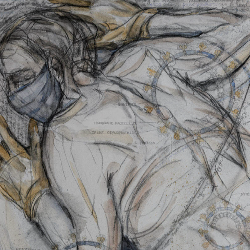Myers Foundations Symposium, "Never Not in Crisis" Reception

When:
Wednesday, October 26, 2022
6:00 PM - 8:45 PM CT
Where: 6018 N. Kenmore Ave., Chicago, IL 60660
Audience: Faculty/Staff - Student - Public - Post Docs/Docs - Graduate Students
Contact:
Elizabeth Upenieks
(847) 491-7597
art-history@northwestern.edu
Group: Department of Art History
Category: Academic, Fine Arts, Lectures & Meetings
Description:
How do we come together in the wake of the ongoing COVID-19 pandemic?
What forms of literature, music, theory, & visual art will facilitate the forms of community we need?
This symposium explores how to engage with the forms of suffering the COVID-19 pandemic has made visible on a global scale, alongside its multiplying aftershocks and afterlives—from economic instability to the War in Ukraine.
---------------------------------------------------------------------------------------
Day One: Reception at 6018North
Zoom: https://asu.zoom.us/j/86907313768
4pm (MST)/6pm (CDT): Suzette Martin, artist's talk on Viral Load, a series of large-scale drawings addressing collective loss during the time of the pandemic.
4:45pm (MST)/6:45pm (CDT): Break to view Martin's Viral Load series, including a virtual tour.
5pm (MST)/ 7pm (CDT): Penelope Papailias (University of Thessaly), "Future Relics of a Damaged Planet I" keynote lab designed to create objects memorializing the time of the pandemic to travel to Tempe. Prompt will be circulated to registrants by Oct. 15.
---------------------------------------------------------------------------------------
Events associated with Never Not in Crisis take place in the Chicago area, Wednesday and Thursday, October 26 and 27, and in the Phoenix area, Saturday, October 29.
The symposium is organized by Jacob Henry Leveton, Program Coordinator of the Institute for Humanities Research at Arizona State University, and Tamar Kharatishvili, PhD Candidate in the Department of Art History at Northwestern University.
We are grateful to acknowledge the funding and logistical support of the Myers Foundations, the Weinberg College of Arts & Sciences, the Department of Art History, the Department of Anthropology, the Chabraja Center for Historical Studies, the Department of History, the Department of English, the Department of French and Italian, the French Interdisciplinary Group, the Department of German, the Program in Comparative Literary Studies, the Program in Environmental Policy and Culture, the Department of Philosophy, and the Science in Human Culture Program, at Northwestern, and the Gray Center for Arts and Inquiry at the University of Chicago.